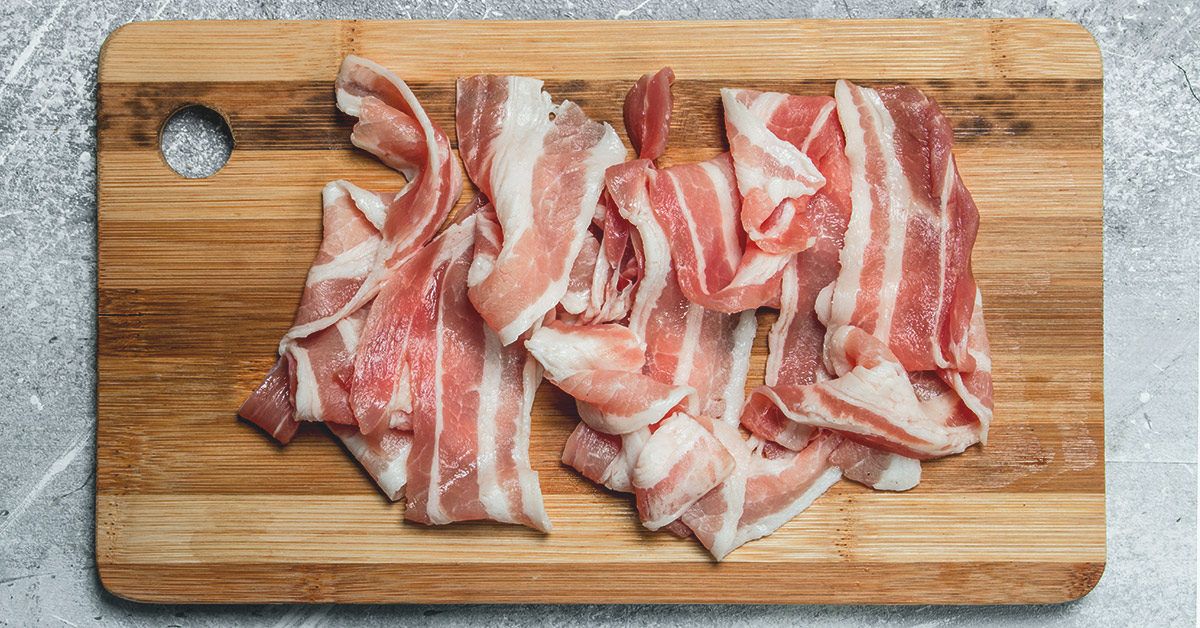Have you ever opened your fridge, spotted leftover bacon, and wondered, “Can you eat cold bacon?” You’re not alone.
This seemingly simple question might have crossed your mind more than once. The good news is you’re about to uncover the answer. Imagine biting into that crispy delight without the hassle of reheating it. Sounds convenient, doesn’t it? But is it safe?
Understanding the facts can save you from potential health risks and open up new, tasty possibilities for your meals. Stick around, because what you learn here could change how you look at bacon forever. Get ready to discover the surprising truth about cold bacon and how it fits into your busy life.

Credit: www.healthline.com
Safety Of Consuming Cold Bacon
Bacon is a beloved breakfast treat. Many enjoy it crispy and warm. But can you eat it cold? Understanding the safety of consuming cold bacon is crucial. Cold bacon is often used in salads or sandwiches. It adds flavor without the need for cooking.
Eating bacon cold is common. People may wonder about its safety. Is it safe to eat bacon straight from the fridge? Let’s explore this.
Is Cold Bacon Safe To Eat?
Bacon that is cooked and stored properly is safe to eat cold. It should be refrigerated soon after cooking. This keeps harmful bacteria at bay. Cold bacon from the store is often pre-cooked. You can eat it without reheating.
Proper Storage Of Bacon
Store bacon in the refrigerator at all times. Use airtight containers or wrap it well. This prevents contamination. Bacon should be eaten within four days of cooking. Proper storage ensures it stays fresh and safe.
Checking Bacon Before Eating
Always check bacon before eating it cold. Look for discoloration or unusual smells. If it smells off, discard it. Fresh bacon should smell pleasant. This indicates it is safe to eat.
Understanding Risks Of Cold Bacon
Cold bacon poses minimal risk if stored correctly. The main risk is bacterial growth. Always check storage conditions. Eating spoiled bacon can cause illness. Consuming fresh, cold bacon is safe and enjoyable.

Credit: www.reddit.com
Nutritional Content Of Cold Bacon
Bacon is a favorite breakfast item worldwide. Cold bacon offers the same nutritional value as hot bacon. Understanding its nutritional content helps make informed dietary choices. Cold bacon retains its flavor and nutrients, making it a convenient option for meals.
Protein In Cold Bacon
Cold bacon contains a good amount of protein. Protein is essential for body repair and growth. A single slice offers around 3 grams of protein. This makes it a satisfying snack or meal addition.
Fat Content
Bacon is known for its high fat content. Cold bacon has the same fat levels as freshly cooked bacon. Most of its calories come from fat. This fat contributes to its rich taste.
Vitamins And Minerals
Cold bacon contains several vitamins and minerals. It provides B vitamins, crucial for energy production. Zinc and iron are also present. They support immune function and oxygen transport.
Sodium Levels
Bacon is salty, whether hot or cold. Cold bacon maintains its sodium content. High sodium intake can affect blood pressure. Consuming in moderation is wise.
Calories In Cold Bacon
Cold bacon is calorie-dense. One slice contains about 42 calories. This makes it a high-energy food. Balance it with other low-calorie foods to manage daily intake.
Common Myths About Cold Bacon
Cold bacon often gets a bad rap. You’ve probably heard some cautionary tales that make you think twice before snacking on those crispy leftovers straight from the fridge. Let’s debunk some common myths about cold bacon, so you can enjoy your breakfast without second-guessing your choices.
Myth: Cold Bacon Is Unhealthy
Many believe cold bacon is a health hazard. They might argue that the grease congeals, making it a heart attack waiting to happen. In reality, bacon’s nutritional profile doesn’t change just because it’s cold. Sure, it’s high in fat, but moderation is key. If you enjoy bacon cold, why not pair it with a salad for a balanced snack?
Consider this: your friend munches on cold bacon and swears by its taste. Does it really matter if it’s hot or cold, as long as it’s part of a balanced diet?
Myth: Cold Bacon Causes Digestive Issues
Is your stomach really going to rebel because you ate cold bacon? Some say it might. But here’s the truth: your digestive system is well-equipped to handle chilled foods. Cold bacon is no different. The temperature doesn’t impact its digestibility.
Have you ever eaten cold pizza without a problem? Cold bacon is no more likely to cause issues. What matters is freshness. Just make sure it’s stored properly in the fridge.
So, next time you eye that leftover bacon, don’t let myths hold you back. What other food myths have you encountered that turned out to be unfounded? Share your thoughts!
Facts About Cold Bacon
Have you ever wondered if you can eat cold bacon? Many people love bacon for its crispy texture and savory taste. But eating it cold raises questions about safety and storage. Let’s explore some important facts about cold bacon.
Fact: Cooking Process And Safety
Bacon becomes safe to eat through proper cooking. Cooking kills harmful bacteria. Ensure bacon reaches an internal temperature of 165°F (74°C). This eliminates potential risks. Cold bacon from a previously cooked batch is generally safe. Just make sure it was cooked thoroughly first.
Fact: Storage And Shelf Life
Proper storage is crucial for cold bacon. Refrigerate cooked bacon within two hours. Store it in an airtight container. This keeps it fresh for up to four days. Freezing is another option. Frozen cooked bacon lasts for up to one month. Always label and date your storage containers. This helps track freshness and safety.
Proper Storage Techniques
Cold bacon can be eaten if stored correctly. Keep it in the fridge for freshness and safety. Proper storage prevents harmful bacteria.
Proper storage techniques for bacon are essential. They keep it fresh and safe. Bacon can be a delightful treat, even when cold. But storing it right is crucial. Let’s explore how refrigeration and freezing can help.
Refrigeration Tips
Store bacon in the fridge soon after buying. Use airtight containers for best results. This prevents it from drying out. Keep the fridge temperature below 40°F. It helps preserve the bacon longer. Always check the expiration date. If bacon smells off, don’t eat it. Freshness is key.
Freezing For Long-term Use
For long-term storage, freezing is ideal. Wrap bacon tightly in plastic wrap. Place wrapped bacon in freezer bags. Label bags with the date for easy tracking. Bacon can be frozen for up to six months. Thaw it in the fridge when ready to eat. Never refreeze thawed bacon. It affects taste and texture.
Creative Ways To Enjoy Cold Bacon
Cold bacon may not be as popular as its sizzling counterpart. Yet it holds a unique charm in its versatility. From salads to sandwiches, cold bacon is a delightful addition to many dishes. Its rich flavor and crispy texture can enhance meals in surprising ways. So, next time you have leftover bacon, consider these creative ideas.
Cold Bacon In Salads
Cold bacon adds a crunchy element to salads. Try it with spinach and cherry tomatoes for a simple, tasty option. The smoky flavor balances fresh greens beautifully. Add crumbled feta for a hint of creaminess. Drizzle with balsamic vinaigrette for a tangy finish. It’s a combination that’s sure to please.
For a heartier salad, toss cold bacon with avocado and boiled eggs. It’s a satisfying meal full of protein and healthy fats. Sprinkle with sunflower seeds for extra crunch. The result is a salad that’s filling and flavorful.
Cold Bacon Sandwich Ideas
Cold bacon can transform a sandwich into a gourmet experience. Pair it with crisp lettuce and juicy tomato slices. Spread some mayonnaise on whole-grain bread for a classic BLT. The bacon’s crunch contrasts nicely with the soft bread.
For a unique twist, add cold bacon to a turkey and cheese sandwich. The bacon adds depth to the mild turkey flavor. Top with honey mustard for a sweet and savory kick. It’s an easy lunch option that’s packed with taste.
For vegetarians, combine cold bacon with grilled veggies. Use bell peppers and zucchini for a colorful sandwich. The bacon’s rich taste complements the veggies perfectly. A sprinkle of goat cheese adds creaminess to this veggie delight.
Health Considerations
Eating cold bacon might sound convenient, but there are health aspects to consider. Bacon is a processed meat, and cold bacon is no exception. Understanding the nutritional content of cold bacon can help make informed choices.
Sodium And Fat Content
Bacon has high sodium levels, which can impact blood pressure. Cold bacon retains these sodium levels, affecting heart health. Fat content in bacon is significant. Eating it cold doesn’t reduce fat. High-fat diets can lead to weight gain and heart issues. Consider these factors when eating cold bacon.
Moderation And Balanced Diet
Moderation is key in consuming processed meats like bacon. Eating it cold can be part of a diet if balanced with other foods. A diet rich in vegetables, fruits, and lean proteins can offset bacon’s effects. Cold bacon should be an occasional treat, not a regular meal component. Balance ensures better health.

Credit: www.healthline.com
Frequently Asked Questions
Is Bacon Ok To Eat Cold?
Yes, you can eat bacon cold if it is fully cooked. Ensure it’s stored properly in the refrigerator. Enjoy it in salads, sandwiches, or as a snack. Always check for freshness and avoid consuming if it smells or looks off.
Can You Have A Cold Bacon Sandwich?
Yes, you can have a cold bacon sandwich. Ensure the bacon is cooked properly beforehand. Cold bacon sandwiches are safe and tasty. Use fresh bread and your choice of condiments for added flavor. Enjoy this simple, quick meal option anytime.
Can You Eat Bacon After A Day?
Yes, you can eat bacon after a day if it’s stored properly in the refrigerator. Ensure it’s tightly sealed to maintain freshness and prevent contamination. Check for any signs of spoilage before consuming.
Do I Need To Reheat Cooked Bacon?
Reheating cooked bacon is optional but recommended for best taste and texture. Eat cold for convenience. Use a microwave, oven, or skillet for reheating. Ensure bacon reaches a safe temperature to avoid any foodborne illness. Enjoy crispy bacon for breakfast, lunch, or dinner.
Final Words
Eating cold bacon is safe if cooked properly. Always store it in the fridge. Freshness is key. Check the sell-by date. Cold bacon can be a tasty snack. Or a sandwich filler. Ensure it’s well-cooked before cooling. This prevents bacteria.
Cold bacon offers a convenient, quick meal option. But not for everyone. Some prefer it hot. Personal preference matters. Enjoy your bacon the way you like. Safety first! Remember to store it correctly. That keeps it fresh and tasty. So, next time, try cold bacon.
You might like it!

Leave a Reply